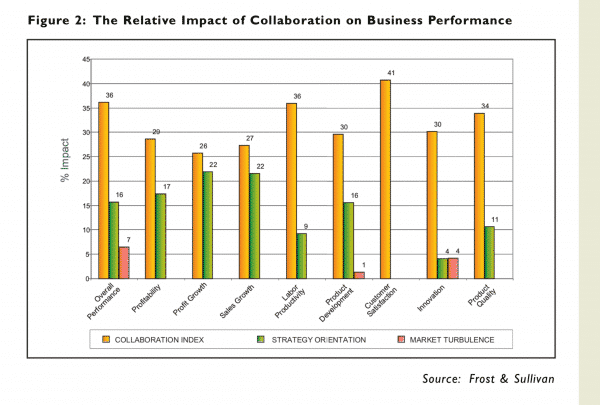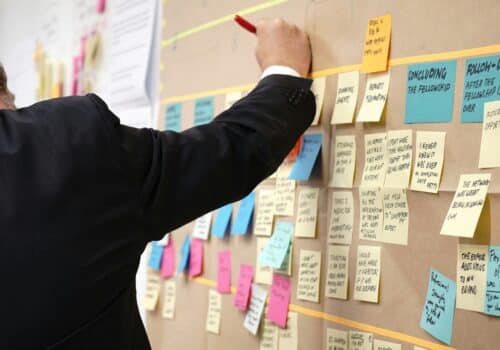Why ERP Collaboration Tools Matter More Than Ever
Collaboration drives all the most important things we help our clients achieve: efficiency, effectiveness/results, engagement, happier people, energy, and ultimately greater productivity and innovation.
To effectively collaborate, however — especially in today’s increasingly digital, global environment — you need two things:
- A workplace culture that encourages collaboration (people)
- Collaboration tools to facilitate communication and connection (technology)
Collaboration works best when these two things are in harmony.
Let’s look at it from the angle of knowledge sharing. Pooling skills and knowledge leads to better, faster problem solving — this is the people aspect. But to effectively pull together that knowledge and make it useful to everyone, you need a tool to capture, store and recall it — that is the technology aspect.
When you align a collaborative culture with the powerful collaboration features in a modern ERP system, your organization can experience benefits like:
- Increased transparency
- Easier access to more data for better decision-making
- Connecting people better across departments and functional areas, and opening up conversation
Collaboration becomes a competitive advantage.
Let’s look a little closer at collaboration and how it empowers manufacturing companies especially.
Why Collaboration Is More Important Than Ever
Let’s start with the bottom line: Good collaboration can improve business performance.
This Frost & Sullivan white paper sponsored by Verizon Business and Microsoft illustrates the point well with the results of their Collaboration Index survey.
Overall, 36% of a company’s performance was due to its Collaboration Index. This is more than twice the impact of a company’s strategic orientation (16%) and more than five times the impact of market and technological turbulence influences (7%).
In addition to the financial benefits of better collaboration, modern collaboration tools have also made it easier and more effective for teams to work together at a distance. They spur knowledge sharing and cooperation even when employees have never met each other face-to-face — a growing reality as companies across every industry have become more global and often more virtual. In the post-COVID world, collaboration across locations is only going to become more important as some functions remain remote for the foreseeable future, and “social distance” is now a way of life.
A Gallup report looked at organizational mindsets that support collaboration, and identified a few key elements they have in common, including:
- Fairness
- Trust
- Acceptance
- A common mission
Unfortunately, that same report also found that the majority of employees don’t believe that they work in an environment where knowledge is openly shared. Trust goes both ways. Employees must trust to collaborate, and collaboration grows trust. In this way, your ERP becomes a trust-building tool by facilitating collaboration.
What happens when employees aren’t able to work together collaboratively? Innovation stalls, mistakes and weaknesses in strategies are missed, and your organization loses the power of group brainstorming. Maybe most importantly, though, functional areas become misaligned. In a way, when your people can’t collaborate, your whole company is working blind.
How Collaboration Benefits Manufacturing Companies
In my experience working with growing manufacturing companies, the collaboration features of ERP benefit manufacturing companies in three very powerful ways.
1. Improved processes
Collaboration reveals gaps, bottlenecks and opportunities for streamlining processes. When diverse teams have the chance to share their input, and can do it easily through collaboration tools, you’re much more likely to create processes that work better for everyone and don’t miss critical steps.
2. Faster, more proactive problem solving
Like improving processes, problem solving goes faster when employees can easily collaborate to brainstorm solutions. Making collaboration part of your workplace culture also enables your company to be more proactive in addressing issues and spotting opportunities both internally and externally (with partners and customers). If one person spots a gap or opportunity, a collaborative culture enabled by technology makes it easier for them to share that information.
3. More educated decision-making
Collaborative working environments empowered by the right collaboration tools make information more readily available to everyone, for every decision that needs to be made. From finding the best suppliers to responding to customer feedback, better information exchange leads to better results.
Improved processes, faster problem solving and more educated decision-making are all supported by collaboration tools increasingly found in enterprise software — including social media and real-time messaging. In a world where social media and messaging tools are known distractions, this may sound counterintuitive. But when used internally and with purpose, these tools make collaboration much easier. And let’s face it: Email was not built for collaboration. In fact, a recent Gartner Digital Worker Survey found that social media and real-time messaging are now key to enterprise collaboration.
Where Collaboration Meets ERP, Magic Happens
Collaboration brings your people together, spreads valuable skills and knowledge throughout your organization, and helps your entire company solve problems and make better decisions together.
When you support collaboration with the right technology, you supercharge your people’s natural collaborative capabilities and reap greater benefits.
Is your organization ready for the collaboration power of a modern ERP? Find out with the ERP Readiness Assessment. Download your complimentary self-assessment today.
ERP Readiness Self-Assessment
Is your organization ready for a new or upgraded ERP solution? Find out with this complimentary self-assessment.
Doing Business Better
You strive for excellence, believe in your people, and want to do things right the first time. And you know that you need help to get to the heart of your business challenges and make the best choices for the future of your privately held manufacturing and distribution company. That’s where we come in.
We help you focus and find exactly the right path to accelerated growth and sustainable success — from your people to your processes to your ERP software.




